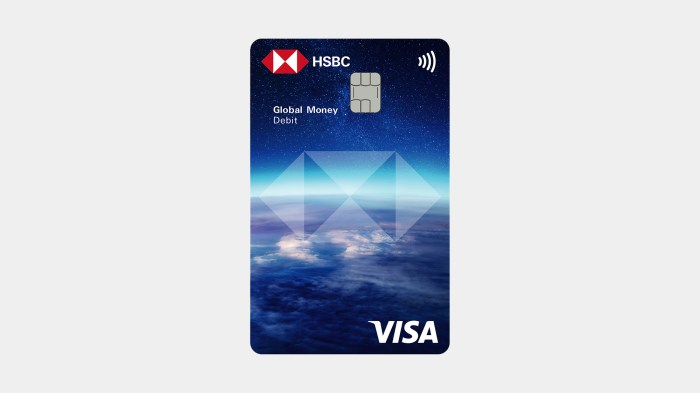HSBC Offshore Account options offer a gateway to international finance, providing diverse solutions for managing wealth and investments across borders. This guide delves into the various account types, their features, the process of opening an account, and crucial considerations regarding taxation, security, and investment strategies. We’ll explore the benefits and drawbacks of each option, helping you make informed decisions about your global financial future.
Understanding the nuances of HSBC offshore accounts requires a thorough examination of several key areas. From navigating the application process and understanding the required documentation to grasping the tax implications and security measures in place, this guide provides a detailed overview to empower you with the knowledge needed to make the best choices for your financial needs.
Opening an HSBC Offshore Account
Opening an HSBC offshore account provides access to international banking services, potentially offering benefits such as diversification of assets and access to different investment opportunities. However, the process involves several steps and requires careful preparation to ensure a smooth application. Understanding the requirements and timelines is crucial for a successful account opening.
Required Documentation and Verification Procedures
HSBC’s offshore account application process necessitates comprehensive documentation to verify your identity, address, and source of funds. This rigorous verification process is essential for compliance with international anti-money laundering (AML) and know-your-customer (KYC) regulations. Failure to provide complete and accurate documentation can lead to delays or rejection of your application. The specific documents required may vary depending on your nationality, residency status, and the type of account you are applying for.
- Proof of Identity: This typically includes a valid passport or national identity card, with clear images of your photograph and personal details.
- Proof of Address: Recent utility bills (e.g., electricity, gas, water), bank statements, or official correspondence addressed to your current residential address are usually accepted. These documents must not be older than three months.
- Source of Funds Documentation: This is a critical aspect of the verification process. HSBC will require evidence demonstrating the legitimate origin of the funds you intend to deposit into your offshore account. This could include bank statements, payslips, tax returns, investment portfolio statements, or documentation related to inheritance or sale of assets.
- Completed Application Form: You will need to complete HSBC’s offshore account application form accurately and completely, providing all requested information.
- Reference Letters (Optional): In some cases, HSBC may request reference letters from professional contacts or financial institutions.
The Account Opening Process: A Step-by-Step Guide
The application process typically involves several distinct stages. It is important to be prepared for each stage to ensure a timely and efficient account opening. HSBC may also request additional information or documentation during the process.
- Initial Consultation: Contact HSBC’s offshore banking division to discuss your requirements and eligibility.
- Application Submission: Complete and submit the application form along with all required supporting documentation.
- Document Verification: HSBC will review your documents to verify your identity, address, and source of funds. This process may involve contacting your previous banks or other references.
- Account Approval: Once HSBC has verified all documentation and deemed you eligible, your account will be approved.
- Account Activation: After approval, your account will be activated, and you will receive your account details and access credentials.
Typical Timeframe for Account Opening and Activation, Hsbc Offshore Account
The timeframe for opening an HSBC offshore account can vary depending on several factors, including the completeness of your application, the complexity of your financial situation, and the volume of applications HSBC is currently processing. While it’s difficult to provide an exact timeframe, it is generally expected that the entire process, from application submission to account activation, could take anywhere from several weeks to several months.
Delays can occur if additional information or documentation is required. For example, an application involving significant assets might require more thorough due diligence, leading to a longer processing time. Conversely, a straightforward application with readily verifiable documentation could be processed much faster.
HSBC Offshore Account Security and Risk Management

HSBC, a global banking giant, offers offshore accounts to high-net-worth individuals and businesses seeking international financial management solutions. However, the decision to utilize such accounts involves careful consideration of both the security measures in place and the inherent risks involved. This section details the security protocols implemented by HSBC and explores the potential challenges associated with offshore banking.
HSBC’s Security Measures for Offshore Accounts
HSBC employs a multi-layered security approach to protect offshore account holders’ funds and information. This includes robust physical security at its branches and data centers, advanced cybersecurity measures such as encryption and firewalls to prevent unauthorized access, and stringent authentication procedures, including multi-factor authentication, to verify account holders’ identities before granting access to their accounts. Regular security audits and penetration testing are conducted to identify and address vulnerabilities proactively.
Furthermore, HSBC adheres to strict international regulatory compliance standards, including those related to anti-money laundering (AML) and combating the financing of terrorism (CFT), contributing to a secure environment for offshore account holders. Employee training programs reinforce security protocols and emphasize the importance of data protection.
Risks Associated with Offshore Accounts
While HSBC implements robust security measures, certain risks are inherent in holding funds in an offshore account. Fraud, including phishing scams and identity theft, remains a significant concern. Political instability in the jurisdiction where the account is held can also impact account access and the security of funds. Changes in tax laws or regulations in either the account holder’s country of residence or the jurisdiction where the account is held can also create unforeseen complexities and potential financial liabilities.
Currency fluctuations can also impact the value of assets held in offshore accounts. Finally, legal complexities in navigating international banking regulations and potential jurisdictional disputes can pose additional challenges.
Comparison of HSBC’s Security Features with Other International Banks
HSBC’s security features for offshore accounts are generally comparable to those offered by other major international banks. Many institutions utilize similar technologies, such as encryption and multi-factor authentication, to secure client data and transactions. However, specific security protocols and the level of investment in cybersecurity infrastructure can vary across banks. The regulatory environment in the jurisdiction where the bank operates also plays a significant role in determining the security standards applied.
A thorough comparison would require a detailed analysis of each bank’s security policies and procedures, which is beyond the scope of this overview.
Recommendations for Mitigating Risks Associated with HSBC Offshore Accounts
To minimize risks associated with HSBC offshore accounts, several precautions are recommended. These include regularly reviewing account statements for any unauthorized transactions, utilizing strong and unique passwords, enabling multi-factor authentication, being wary of phishing attempts and other forms of online fraud, and staying informed about any changes in tax laws or regulations that may impact offshore accounts. Diversifying assets across multiple accounts and jurisdictions can also help mitigate risks associated with political instability or other unforeseen events.
Engaging with a qualified financial advisor experienced in international banking can provide valuable guidance on managing the complexities of offshore accounts and minimizing potential risks. Furthermore, understanding the terms and conditions of the account agreement and the bank’s security policies is crucial for informed decision-making.
HSBC Offshore Account
HSBC offers a comprehensive suite of investment and wealth management services tailored to the needs of its offshore account holders. These services are designed to help clients grow and protect their wealth, leveraging HSBC’s global network and expertise in international finance. Access to these services is typically contingent upon meeting specific eligibility criteria and minimum investment thresholds.
Investment Options Available Through HSBC Offshore Accounts
HSBC provides access to a diverse range of investment options, catering to various risk tolerances and financial goals. Clients can choose from a variety of asset classes, allowing for a customized investment portfolio. The specific offerings may vary depending on the client’s jurisdiction and individual circumstances.
- Equities: Access to global stock markets, including developed and emerging markets, allowing for diversification across various sectors and geographies.
- Fixed Income: Investment in bonds, government securities, and other fixed-income instruments, offering a potentially stable income stream and lower risk compared to equities.
- Mutual Funds: A diversified portfolio of securities managed by professional fund managers, providing convenient access to a range of asset classes.
- Alternative Investments: Access to alternative asset classes such as private equity, hedge funds, and real estate, potentially offering higher returns but with increased risk.
- Structured Products: Investment products designed to meet specific investment objectives, often incorporating derivatives to manage risk and enhance returns. These can be complex and require careful consideration.
Investment Strategies Employable with HSBC Offshore Accounts
HSBC’s wealth management advisors work with clients to develop personalized investment strategies aligned with their individual financial goals, risk tolerance, and time horizon. These strategies can range from conservative to aggressive, depending on the client’s preferences.
- Passive Investing: Investing in index funds or ETFs that track a specific market index, offering broad market exposure with lower management fees.
- Active Investing: Employing a more hands-on approach, selecting individual securities based on fundamental or technical analysis, aiming to outperform the market.
- Growth Investing: Focusing on companies with high growth potential, potentially leading to higher returns but also increased risk.
- Value Investing: Identifying undervalued companies with strong fundamentals, aiming to capitalize on market inefficiencies.
- Income Investing: Prioritizing investments that generate regular income, such as dividend-paying stocks or bonds.
International Diversification of Assets Using HSBC Offshore Accounts
HSBC offshore accounts facilitate international diversification, mitigating risk by spreading investments across different countries and asset classes. This reduces the impact of adverse events in a single market.For example, consider a hypothetical portfolio designed for international diversification:
| Asset Class | Allocation | Rationale |
|---|---|---|
| US Equities | 30% | Exposure to the largest and most developed economy. |
| European Equities | 20% | Diversification within developed markets, access to different sectors. |
| Emerging Market Equities | 15% | Higher growth potential, but also increased risk. |
| Global Bonds | 20% | Provides stability and income stream, hedging against equity market volatility. |
| Real Estate (International) | 10% | Tangible asset class, potential for long-term appreciation and rental income. |
| Alternative Investments | 5% | Potential for higher returns, but with increased risk (e.g., a small allocation to a diversified hedge fund). |
This example illustrates how an HSBC offshore account can be used to build a globally diversified portfolio, reducing reliance on any single market and potentially enhancing overall returns while managing risk. The specific asset allocation would depend on the individual investor’s risk tolerance, investment goals, and financial circumstances. It’s crucial to remember that past performance is not indicative of future results, and all investments carry risk.
HSBC Offshore Account

HSBC offers offshore banking services to high-net-worth individuals and businesses seeking international financial solutions. Understanding the accessibility and support provided is crucial for prospective and existing clients. This section details the various customer support channels, account access methods, and a comparison with competitor offerings.
HSBC Offshore Account Customer Support Channels
HSBC provides a multi-faceted approach to customer support for its offshore accounts, recognizing the diverse needs and locations of its clientele. Clients can typically access support through several channels, ensuring a convenient and responsive service experience.
| Support Channel | Availability | Description |
|---|---|---|
| Telephone | 24/7 (availability may vary depending on location and specific service) | Dedicated phone lines provide direct access to customer service representatives for immediate assistance with account inquiries, transactions, and problem resolution. Expect potential language support depending on your location and the specific team. |
| Response times vary, typically within 24-48 hours (depending on query complexity) | Email support offers a convenient method for non-urgent inquiries and detailed requests. Clients can expect a documented response trail for future reference. | |
| Online Chat | Business hours (availability may vary by region) | Real-time online chat allows for quick answers to straightforward questions and immediate support during online banking sessions. |
| In-Person Appointments | By appointment only at select HSBC branches | For complex matters or those requiring in-person interaction, appointments can be scheduled at designated branches. Availability varies depending on location. |
HSBC Offshore Account Access and Management
Accessing and managing an HSBC offshore account is primarily achieved through online banking platforms. These platforms offer a secure and convenient method to monitor account balances, initiate transactions, and manage account settings. In addition to online banking, some clients may have access to mobile banking apps offering similar functionality on smartphones and tablets. For clients preferring traditional methods, access may also be available through dedicated phone lines for transaction initiation and balance inquiries.
Accessibility Comparison with Competing Institutions
Comparing HSBC’s offshore banking accessibility with competitors requires considering specific features and services. While many international banks offer online banking and phone support, HSBC’s global network of branches may provide a competitive advantage for clients needing in-person assistance. However, the specific availability of services like 24/7 phone support and multilingual options can vary significantly between institutions, and a thorough review of individual bank offerings is necessary for an accurate comparison.
Factors like language support, the breadth of online features, and the availability of physical branches in specific locations are key differentiators to consider.
Successfully navigating the world of HSBC offshore accounts requires careful planning and a comprehensive understanding of the associated complexities. This guide has provided a framework for understanding the different account types, the application process, tax implications, security measures, and investment opportunities. By weighing the advantages and disadvantages of each option and proactively addressing potential risks, you can leverage the benefits of an HSBC offshore account to achieve your financial goals while maintaining full compliance.

